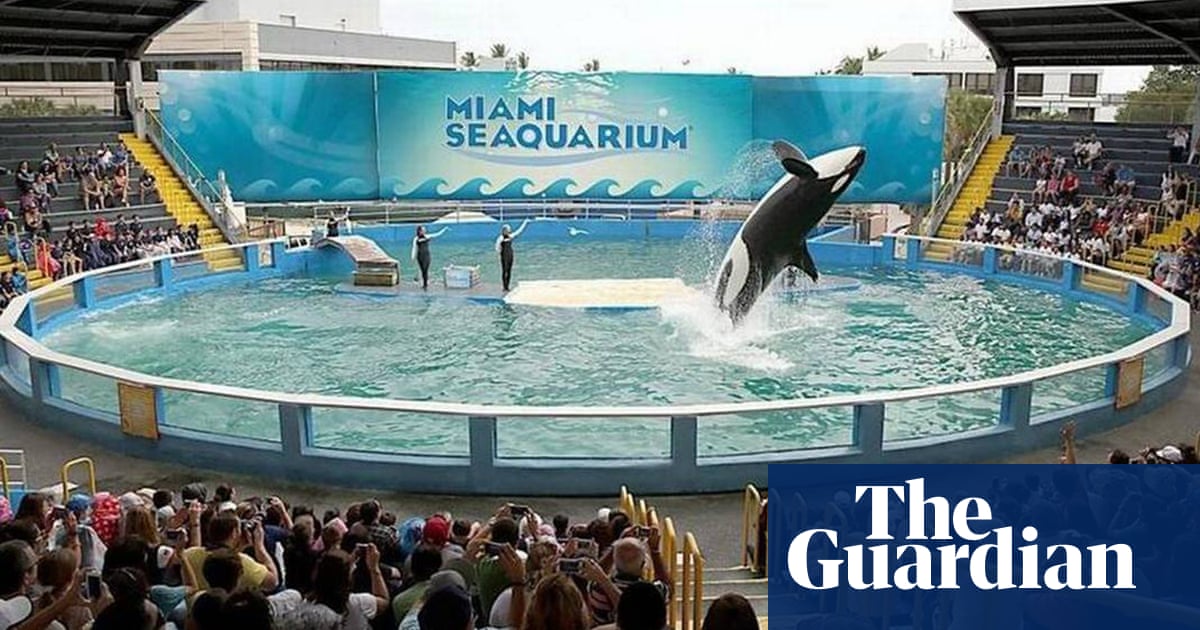
On Friday, as the captive orca whale known as Tokitae was dying in Miami, an unusual phenomenon took place in the waters where she was taken from her pod back in 1970. A rare superpod meetup of three clans – the J, K and L pods – happened off the west side of San Juan Island, in Washington state.
It could have been a coincidence. But for activists like Howard Garrett, who has worked for decades to advocate for the release of Tokitae, there was deep meaning in the meetup. “Gatherings like this are often a cultural social ritual to mark a significant event in their community, and we believe they are welcoming Toki home,” he wrote on the Orca Network Facebook group. “She is finally home, maybe not the way we wanted, but her family seems to know she is with them once again, in ways we may never comprehend.”
Toki’s death has rippled across the country. There are candlelight vigils planned on Whidbey Island, Washington, and outside the Seaquarium in Miami on Saturday evening.
Peta also held two vigils outside the Seaquarium on Friday and Saturday to honor the whale, who went by Lolita in her show business life. “Kind people begged the Miami Seaquarium to end Lolita’s hellish life in a concrete cell and release her to a seaside sanctuary, where she could dive deep, feel the ocean’s currents, and even be reunited with the orca believed to be her mother,” wrote Peta president Ingrid Newkirk in a statement, “but plans to move her to a seaside sanctuary came too late, and Lolita was denied even a minute of freedom from her grinding 53 years in captivity.”
The group says it urges families to honor Toki’s memory by never visiting marine parks and is calling on the Seaquarium to continue with plans to send the dolphin who was Toki’s tankmate to a sea sanctuary, along with all of the other dolphins it maintains.
Whale activists are still reeling from the conditions in which Toki lived. In September 2021, the USDA’s Animal and Plant Health Inspection Service released an inspection report for Miami Seaquarium, which chronicled a number of extremely troubling incidents at the marine theme park, including an injury to Toki’s jaw from performances, poor water quality issues, and records and interviews with staff that showed that Toki and other animals were fed rotting fish. Then, within a three-week period at the end of 2021, a dolphin, a harbor seal and a manatee died.
Toki’s owners at the Seaquarium had long rejected calls for freedom, saying that releasing the animal into the wild would doom her while robbing her of professional care and feeding. But recently plans to ensure her release – and funding to care for her throughout her life (in the wild, female orcas can live to 100 or more) – were gaining traction.
Just this week, the whale had started to train to use a giant sling to eventually transport her out of the tank and into a plane for new waters. Sadly, that same sling was used to remove her body when her life ended on Friday afternoon.
Plans for a burial or final goodbye are in the planning stages, Pritam Singh, founder of the nonprofit Friends of Toki, told the Miami Herald.
“For the first time in her long life in that horrible tiny tank, she had hope,” said Naomi Rose, a marine mammal scientist at the Animal Welfare Institute, in a statement. “It is a sad irony that Tokitae died now. Humans failed her.”
The Center for Whale Research, which maintains a southern resident population count for the National Oceanic and Atmospheric Administration, gave one word as a reaction to Toki’s death: “Heartbroken. A word that minimally describes the feelings we have,” the center stated. “She was captured and spent her life deprived of her family and a life of freedom. Thank you to all who dedicated their love and energy to try and change this. Toki will never be forgotten.”
The latest count of the wild southern resident killer whales – the group Toki belonged to – is 73, according to the center’s population survey.
The Lummi people consider orcas to be their relatives and had long fought for the freedom of Toki, whom they called Sk’aliCh’elh-tenaut – which means a member of Sk’aliCh’elh, a family of orcas who live primarily in the Salish Sea.
“The Lummi Nation is saddened by the news that our beloved Orca relative has passed away at the estimated age of 57 years old,” according to the statement. “Our hearts are with all those impacted by the news; our hearts are with her family. We stand in solidarity with our Lummi members who poured their hearts and souls into bringing Sk’aliCh’elh-tenaut home.”












